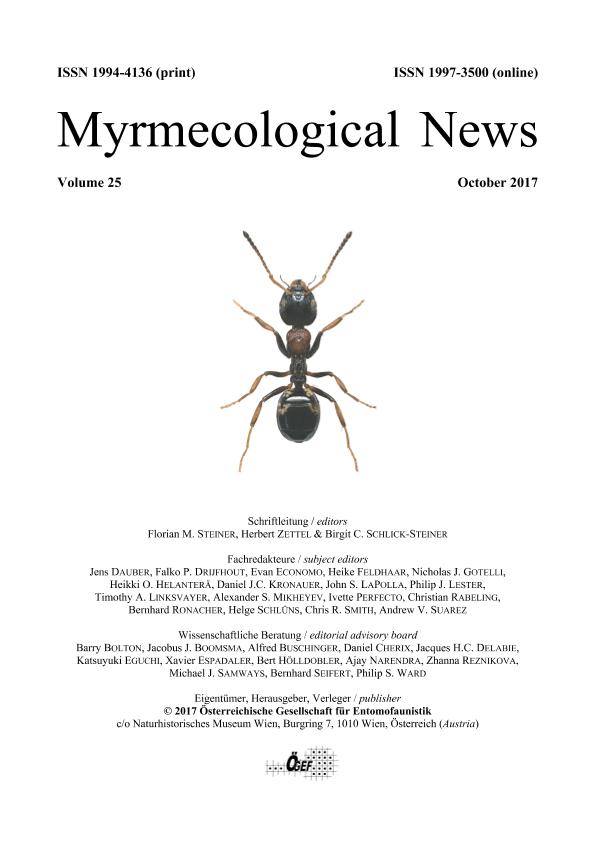Artículo
Coexisting in harsh environments: temperature-based foraging patterns of two desert leafcutter ants (Hymenoptera: Formicidae: Attini)
Nobúa Behrmann, Beatriz Elisa ; Lopez de Casenave, Javier Nestor
; Lopez de Casenave, Javier Nestor ; Milesi, Fernando Adrian
; Milesi, Fernando Adrian ; Farji Brener, Alejandro Gustavo
; Farji Brener, Alejandro Gustavo
 ; Lopez de Casenave, Javier Nestor
; Lopez de Casenave, Javier Nestor ; Milesi, Fernando Adrian
; Milesi, Fernando Adrian ; Farji Brener, Alejandro Gustavo
; Farji Brener, Alejandro Gustavo
Fecha de publicación:
10/2017
Editorial:
Oesterreichische Gesell Entomofaunistik
Revista:
Myrmecological News
ISSN:
1994-4136
e-ISSN:
1997-3500
Idioma:
Inglés
Tipo de recurso:
Artículo publicado
Clasificación temática:
Resumen
Dominant herbivores, like leafcutter ants, have a strong impact on the ecosystems they inhabit. Understanding which factors regulate their foraging rates is crucial for understanding ecosystem dynamics. In desert habitats, environmental factors, such as temperature, play a major role in regulating ants' behavior. We studied the role of ground temperature in regulating daily and seasonal activity patterns of two coexisting leafcutters ant species, Acromyrmex lobicornis (EMERY, 1888) and A. striatus (ROGER, 1863), in the Monte desert of Argentina. We measured the variations in activity levels and soil temperature every two hours throughout the day in colonies of both species every season for two consecutive years. Temperature was a good predictor of both the timing of colony activation (the onset and end of their daily foraging activities) and foraging intensity (the number of workers devoted to foraging tasks). However, temperature affected each species differently: Acromyrmex lobicornis foraged at lower temperatures (10 - 35 °C) than A. striatus (27 - 45 °C). Our results suggest that these two species have different thermal tolerance ranges that result in temporally separated foraging activities. We suggest that interference competition may have driven this temperature and temporal specialization in these two sympatric species, given their similar sizes and diets. Field observations of activity vs. temperature in allopatry, and behavioral tests in controlled conditions should provide further evidence to test this hypothesis.
Palabras clave:
Leaf-Cutting Ants
,
Foraging
,
Herbivory
Archivos asociados
Licencia
Identificadores
Colecciones
Articulos(IEGEBA)
Articulos de INSTITUTO DE ECOLOGIA, GENETICA Y EVOLUCION DE BS. AS
Articulos de INSTITUTO DE ECOLOGIA, GENETICA Y EVOLUCION DE BS. AS
Articulos(INIBIOMA)
Articulos de INST. DE INVEST.EN BIODIVERSIDAD Y MEDIOAMBIENTE
Articulos de INST. DE INVEST.EN BIODIVERSIDAD Y MEDIOAMBIENTE
Citación
Nobúa Behrmann, Beatriz Elisa; Lopez de Casenave, Javier Nestor; Milesi, Fernando Adrian; Farji Brener, Alejandro Gustavo; Coexisting in harsh environments: temperature-based foraging patterns of two desert leafcutter ants (Hymenoptera: Formicidae: Attini) ; Oesterreichische Gesell Entomofaunistik; Myrmecological News; 25; 10-2017; 41-49
Compartir



